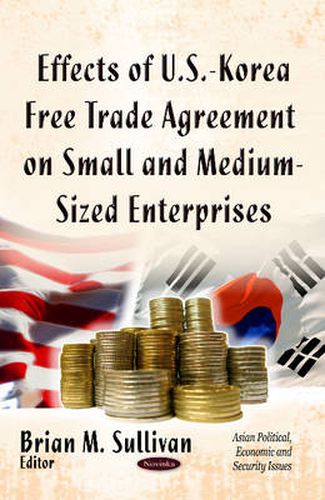Readings Newsletter
Become a Readings Member to make your shopping experience even easier.
Sign in or sign up for free!
You’re not far away from qualifying for FREE standard shipping within Australia
You’ve qualified for FREE standard shipping within Australia
The cart is loading…






The U.S.-South Korea Free Trade Agreement (KORUS FTA) is the second-largest U.S. FTA (next to NAFTA). South Korea is the seventh largest trading partner of the United States, and the United States is South Korea’s third-largest trading partner. The KORUS FTA covers a wide range of trade and investment issues and, therefore, could have substantial economic implications for both the United States and South Korea. KORUS FTA encompasses a range of bilateral economic activities: trade in manufactured goods, agricultural products, and services; foreign investment; government procurement; intellectual property rights; and worker rights and environment protection, among other issues. The United States and South Korea entered into the KORUS FTA as a means to further solidify an already strong economic relationship by reducing barriers to trade and investment between them and to resolve long-standing troublesome economic issues. The United States specifically sought increased access to South Korean markets for agricultural products, services, and foreign investment. For South Korean leaders, the KORUS FTA is a mechanism to promote reform in its own economy and also to gain a competitive advantage in the U.S. market for autos and other manufactured goods. This book examines the provisions of the KORUS FTA in the context of the overall U.S.-South Korean economic relationship, U.S. objectives, and South Korean objectives. It also examines some of the issues that have arisen during its implementation.
$9.00 standard shipping within Australia
FREE standard shipping within Australia for orders over $100.00
Express & International shipping calculated at checkout
Stock availability can be subject to change without notice. We recommend calling the shop or contacting our online team to check availability of low stock items. Please see our Shopping Online page for more details.
The U.S.-South Korea Free Trade Agreement (KORUS FTA) is the second-largest U.S. FTA (next to NAFTA). South Korea is the seventh largest trading partner of the United States, and the United States is South Korea’s third-largest trading partner. The KORUS FTA covers a wide range of trade and investment issues and, therefore, could have substantial economic implications for both the United States and South Korea. KORUS FTA encompasses a range of bilateral economic activities: trade in manufactured goods, agricultural products, and services; foreign investment; government procurement; intellectual property rights; and worker rights and environment protection, among other issues. The United States and South Korea entered into the KORUS FTA as a means to further solidify an already strong economic relationship by reducing barriers to trade and investment between them and to resolve long-standing troublesome economic issues. The United States specifically sought increased access to South Korean markets for agricultural products, services, and foreign investment. For South Korean leaders, the KORUS FTA is a mechanism to promote reform in its own economy and also to gain a competitive advantage in the U.S. market for autos and other manufactured goods. This book examines the provisions of the KORUS FTA in the context of the overall U.S.-South Korean economic relationship, U.S. objectives, and South Korean objectives. It also examines some of the issues that have arisen during its implementation.